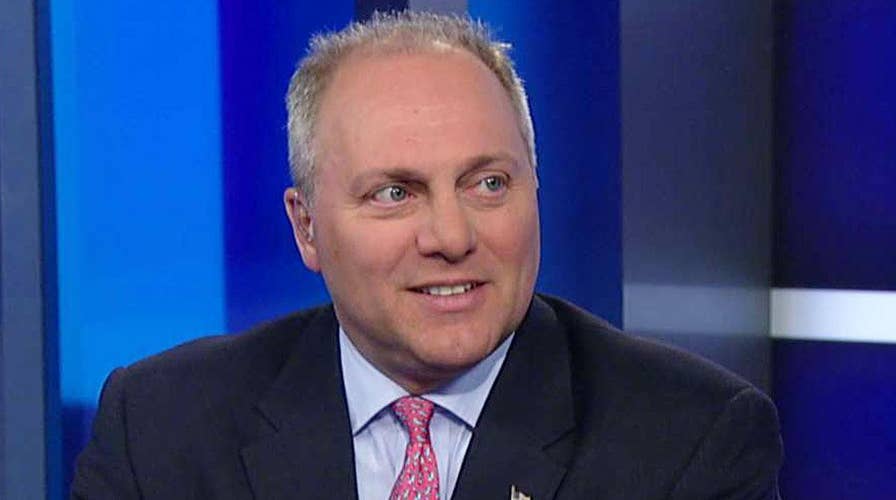Scalise: CBO got it wrong on ObamaCare replacement
House Majority Whip Steve Scalise breaks down Congressional Budget Office's analysis that 14 million more people would be uninsured in 2018 under the GOP repeal plan #Tucker
Congressional budget scorekeepers released their highly anticipated analysis of Republicans’ ObamaCare repeal bill late Monday, estimating millions more people would be uninsured under the legislation – though the federal deficit and premiums also would shrink in the long-term.
The Congressional Budget Office predicted 14 million more people would be uninsured in 2018, with that number growing to 24 million by 2026. The estimate swiftly fueled opponents’ warnings that the measure would toss millions of voters off insurance plans.
“The CBO's estimate makes clear that TrumpCare will cause serious harm to millions of American families,” Senate Minority Leader Chuck Schumer, D-N.Y., said in a statement. “… This should be a looming stop sign for the Republicans repeal effort.”
GOP supporters of the repeal plan, however, for days have downplayed the significance of the CBO findings, noting that the same office’s coverage projections for the original Affordable Care Act were off by millions.
Trump administration officials pushed back on the report late Monday, with Health Secretary Tom Price saying the CBO looked only at the bill before Congress, and not the regulatory reforms and flexibility for states also being planned.
“The coverage numbers are in fact going down,” Price said. “The CBO looked at a portion of a plan but not the entire plan.”
Office of Management and Budget Director Mick Mulvaney argued the idea that people on ObamaCare through Medicaid would drop out immediately is “just absurd.”
House Speaker Paul Ryan, R-Wis., told Fox News' "Special Report with Bret Baier" that he was "pretty encouraged" by the report and claimed it "actually exceeded my expectations."
"Where I’m encouraged is once our reforms kick in, what the CBO is telling us is it’s going to lower premiums," Ryan said. "I’m excited about this analysis and yeah, I think they sort of overestimate the uninsured number just like they overestimated who would be insured by ObamaCare."
While millions are projected to lose insurance under the plan, the CBO projected this would largely be due to individuals opting to drop coverage in the event the so-called “mandate” is lifted.
To this point, Ryan said, “Our plan is not about forcing people to buy expensive, one-size-fits-all coverage. It is about giving people more choices and better access to a plan they want and can afford. When people have more choices, costs go down.”
President Trump contends the current law is unsustainable.
“It’s imploding,” Trump said in a meeting earlier Monday with Americans the White House described as “victims” of ObamaCare. He vowed the Republican plan eventually would bring insurance costs “down, down, down.”
The CBO report noted that while new tax credits largely would be “less generous for those receiving subsidies under current law,” other changes would “lower average premiums enough to attract a sufficient number of relatively healthy people to stabilize the market.”
The CBO said the plan would probably increase average premiums in the nongroup market until 2020, after which costs would decrease.
“In 2018 and 2019 … average premiums for single policyholders in the nongroup market would be 15 percent to 20 percent higher,” the report said. “… By 2026, average premiums for single policyholders in the nongroup market under the legislation would be roughly 10 percent lower than under current law.”
The CBO noted insurers would be allowed to charge older enrollees significantly more.
The CBO report, compiled along with staff of the Joint Committee on Taxation, also determined that the Republicans’ American Health Care Act would save money for taxpayers. According to the study, it would reduce federal deficits by $337 billion from 2017 to 2026.
The report’s estimate on the number of uninsured nevertheless could overshadow projections about premiums and taxpayer savings, fueling critics. Criticism so far has come from Democrats, Republicans from states that benefit from Obama's law and many corners of the health-care industry.
According to the CBO, the projected loss in insurance coverage is related mostly to a provision repealing penalties associated with the ACA’s requirement to buy insurance.
“Some of those people would choose not to have insurance because they chose to be covered by insurance under current law only to avoid paying the penalties, and some people would forgo insurance in response to higher premiums,” the CBO said.
Republican leaders have said their aim is to lower health care costs. They say coverage statistics are misleading because many people covered under Obama's law have high out-of-pocket costs that make health care unaffordable.
The Associated Press contributed to this report.






















